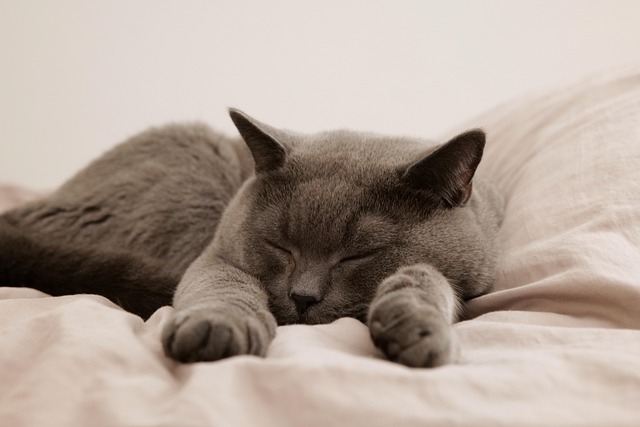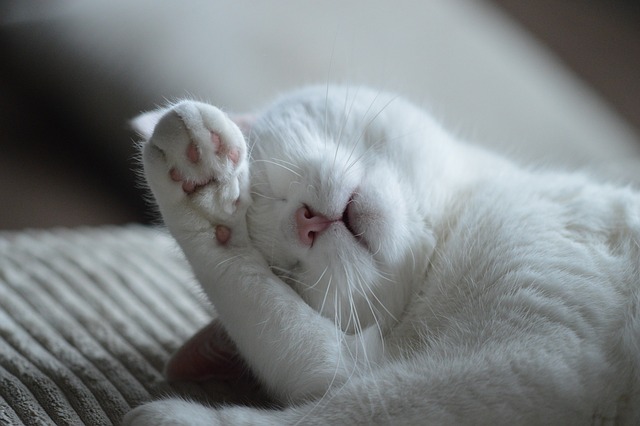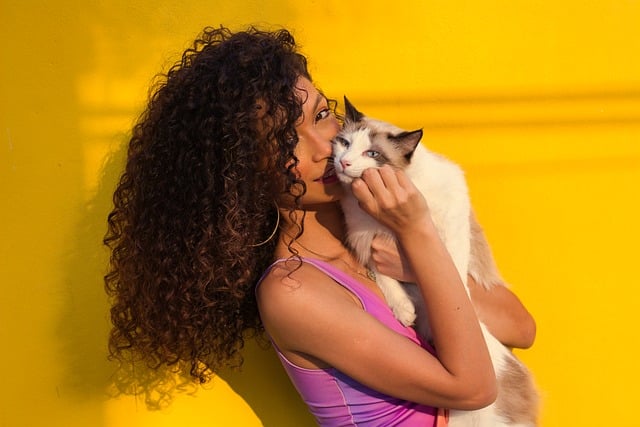Have you ever noticed your cat growling in sleep and wondered what’s going on? It can be surprising, even alarming, but in most cases, it’s completely normal. Cats, like humans, go through various sleep stages, and vocalizing during sleep can be part of that process.
Understanding Cat Sleep Cycles

Before explaining why your cat growls in sleep, it’s helpful to understand how feline sleep works. Cats go through light and deep sleep cycles, including REM (Rapid Eye Movement) sleep, the phase where dreams occur. During REM sleep, it’s common for cats to twitch, purr, and, yes, even growl.
Why Is My Cat Growling in Sleep? Common Reasons

Here are the main reasons behind this behavior,
- Dreaming of Hunting or Play
Cats are natural predators. Even while asleep, they may dream of stalking, chasing, or playing with prey. This can trigger instinctual reactions like growling or twitching. If your cat is growling in sleep, it could just be caught up in an adventurous dream. - Stress or Anxiety
Cats sensitive to changes in their environment—like moving homes, a new pet, or disrupted routines—can experience stress, even while asleep. This may manifest as restless movements or vocalizations like growling. - Territorial Dreams
Cats are highly territorial animals. Sometimes, growling in their sleep is simply a reflection of their instinct to protect their space. In multi-pet homes, this may happen more frequently. - Discomfort or Health Issues
Although rare, if your cat growling in sleep is paired with signs like limping, flinching, or appetite loss, it might be due to physical discomfort or pain. Conditions like arthritis, dental issues, or digestive troubles could be behind it. - Habitual or Involuntary Vocalization
Some cats are just more vocal than others. If your cat tends to make noises while awake, this behavior may carry over into their dreams. It could also be a learned behavior or simply part of their personality.
Is It Normal for a Cat to Growl While Sleeping?
Yes, a cat growling in sleep is generally normal, especially during REM sleep. It’s usually harmless unless it’s accompanied by signs of illness or behavioral changes. Monitoring their overall behavior will help you determine if a vet visit is necessary.
How to Handle a Cat Growling in Sleep

If you’re concerned or want to help your cat rest better, consider these tips:
- 💤 Create a Calm Sleeping Environment
Make sure your cat’s sleeping space is quiet, cozy, and undisturbed. Reducing environmental stress can lessen anxiety-driven growling.
- 🩺 Watch for Health Changes
Keep an eye on your cat’s behavior when awake. If you notice signs of discomfort, lethargy, or appetite loss along with frequent growling, schedule a vet check-up.
- ⏰ Stick to a Routine
Cats thrive on routine. Feeding, playing, and sleeping at regular times can reduce stress and help them rest more peacefully.
- ❗ Don’t Wake Them Suddenly
Avoid waking your cat abruptly while they’re growling in sleep. Startling them can increase stress or lead to defensive behavior.
- 🎯 Provide Enrichment
Boredom can lead to restless sleep. Make sure your cat has toys, scratching posts, and daily playtime to expend energy and promote deeper rest.
When to Seek Professional Help
Although sleep growling is commonly benign, certain situations may indicate a deeper issue. If your cat’s growling continuously, is linked with unusual behavior, or if you notice important changes in their health or behavior, it’s advisable to consult a professional. A veterinarian can check out your cat’s health and determine if any underlying medical issues need to be addressed
How to Help Your Cat Sleep Peacefully
Here are a few simple tips to make sure your cat gets restful sleep:
- Create a calm sleeping area: Find a quiet and cozy spot for your cat to sleep without disturbances.
- Stick to a routine: Cats love consistency. Feed and play with your cat at the same time each day.
- Reduce stress: Try to avoid big changes all at once. If your cat is anxious, calming sprays or toys might help.
- Keep your cat active during the day: Playtime helps burn off energy and leads to better sleep.
Cat Growling: Frequently Asked Questions
Could growling in their sleep indicate a health problem?
Growling is a typical sleeping behavior in cats. Mostly, there’s no medical explanation for growling when sleeping. However, if your cat starts growling very often, displays signs of uneasiness during wakefulness, that could be associated with a disease or health condition like arthritis, pain, and so on. If the other symptoms begin to appear with the growl of the cat, then get a veterinarian because of the possible health condition.
How can I stop my cat from growling in its sleep?
You cannot help but stop your cat from growling in their sleep, for that is the most natural thing when they are dreaming. However, ensuring your cat has a calm and non-tense environment reduces anxiety-related growling. The provision of routine, a quiet space to sleep, and full enrichment during the day may help.
Can stress make a cat growl in its sleep?
Yes, it is possible for stress to cause a cat to growl while asleep. Since cats are very sensitive to what goes on in their environment, they may not have a sound restful sleep if they are stressed or upset. New pets, changes in routine, and strange noises can all be some of the environmental factors that cause them to get restless while sleeping and growl. Careful design of a safe and quiet resting place for the cat would naturally reduce the occurrence of stress-related growling.
Does growling during sleep mean my cat is dreaming about something bad?
Not necessarily. Cats are known to growl when they sleep, and this can be due to excitement, territorial instincts, or even frustration in a dream. Some cats dream of hunting or showing off their territory, which does not mean that they’re dreaming about something “bad.” It is just natural instinctual behaviors shining through in their sleep.
Conclusion
Hearing your cat growling in their sleep can be concerning, but it’s usually a natural response to dreams, instincts, or discomfort. Understanding why cats growl, whether from fear, territorial behavior, or underlying health issues, helps you provide the right care and environment for them. Always observe their body language and consult a vet if the growling seems excessive or unusual. By respecting your cat’s boundaries and ensuring they feel safe, you can help them rest peacefully and strengthen your bond.

